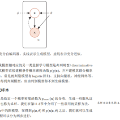We present SURE-Score: an approach for learning score-based generative models using training samples corrupted by additive Gaussian noise. When a large training set of clean samples is available, solving inverse problems via score-based (diffusion) generative models trained on the underlying fully-sampled data distribution has recently been shown to outperform end-to-end supervised deep learning. In practice, such a large collection of training data may be prohibitively expensive to acquire in the first place. In this work, we present an approach for approximately learning a score-based generative model of the clean distribution, from noisy training data. We formulate and justify a novel loss function that leverages Stein's unbiased risk estimate to jointly denoise the data and learn the score function via denoising score matching, while using only the noisy samples. We demonstrate the generality of SURE-Score by learning priors and applying posterior sampling to ill-posed inverse problems in two practical applications from different domains: compressive wireless multiple-input multiple-output channel estimation and accelerated 2D multi-coil magnetic resonance imaging reconstruction, where we demonstrate competitive reconstruction performance when learning at signal-to-noise ratio values of 0 and 10 dB, respectively.
翻译:我们提出了SURE-Score:一种使用被加性高斯噪声污染的训练样本学习基于分数的生成模型的方法。最近表明,当有大量干净样本的训练集可用时,利用在干净数据分布上训练的基于分数(扩散)生成模型求解反问题优于端到端监督的深度学习。在实践中,这样的大量训练数据可能在第一次获取时成本过高。在这项工作中,我们提出了一种从噪声训练数据中近似学习干净分布的基于分数的生成模型的方法。我们制定并证明了一种新的损失函数,利用斯坦的无偏风险估计通过去噪分数匹配联合去噪数据和学习分数函数,同时仅使用噪声样本。我们通过学习先验并在两个不同领域的实际应用中应用后验采样来证明SURE-Score的通用性:压缩无线多输入多输出信道估计和加速的2D多线圈磁共振成像重建,在分别学习信噪比值为0和10 dB时,我们证明了有竞争力的重建性能。


